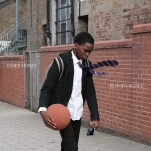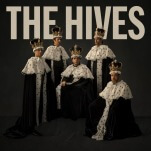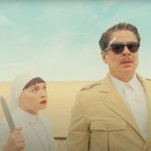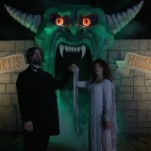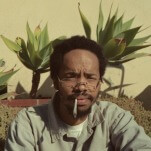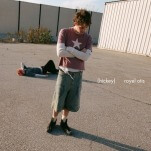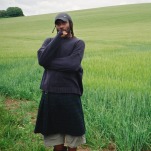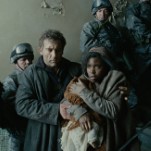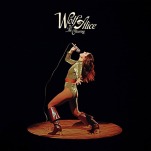Modest Mouse
BLIZZARD OF ODD
Welcome to Sony Pictures Studios, serving all your production needs now and in the future. This cheerfully innocuous sign greets visitors to Sony Pictures Studios’ famous Stage 27 in Culver City, Calif., essentially Glitterville’s Ground Zero, and the site where the Wizard of Oz’s Munchkinland scenes were filmed nearly 70 years ago. It’s a place that has witnessed more than its share of cinematic oddities over the years (Under the Rainbow, anybody?) and, in this context, the project currently occupying the mammoth 32,000-square-foot facility is just another brick in the wall of historic Tinseltown weirdness.
Formerly-indie rock sextet Modest Mouse has been filming the video for driving new single “Dashboard”—from its first LP in three years, We Were Dead Before the Ship Even Sank—in the cavernous soundstage since the wee hours of morning. (Frontman Isaac Brock even endured a two-hour makeup routine, starting at 7:30 a.m.). By late afternoon, it’s clear that the band members and the roughly 70-person crew are listing heavily toward “punchy.”
As if spending the holidays in Hollywood—replete with Santas in boardshorts and blinged-out, Hummer-sized roadside menorahs—weren’t surreal enough, as I walk through the gigantic sliding door to the stage, the winter sunlight behind me gives way to the dusky greys of the building’s interior, where a set replicating a ship’s below-decks mess area occupies both the center of Stage 27’s vast concrete floor and the crew’s rapt attention as the morning’s filming concludes. Brock, having completed his required scenes, has stalked off in his Amish beard and seafarer’s get-up, temporarily leaving behind the Captain Hook-like microphone that serves as his character’s prosthetic hand. There’s an actor who strongly resembles Kirk Douglas chatting up the crew, and, between takes, a salty-looking extra sporting ZZ Top-length facial hair grazes the food-service tables, which are stacked generously with snacks from the local Ralphs market. In a far corner sit the only comfortable chairs in the entire football-field-sized room, a pair of worn-in couches occupied by various PR types; a friendly looking dog; Brock’s girlfriend, Naheed Simjee (who also manages his record label, Glacial Pace); and Modest Mouse manager Juan Carrera. They slouch in silence, fixated on a large-screen TV piping in “dailies” from the morning’s shoot.
Meanwhile, former Smiths guitarist Johnny Marr, the group’s newest conscript—and at a relatively sage 43 years, its most senior member by about a decade—strolls nonplussed through the insanity cradling a steaming cup of tea. He looks every inch the rock star in his Aladdin Sane-era yellow face makeup with pink lightning bolt and matching Technicolor trench coat, goggles perched jauntily atop his head. Calmly surveying the chaos unfolding around him, he adjusts the tonearm on his flying-robot-maid guitar while attempting to put his new gig into context. “Modest Mouse doesn’t discuss direction, its future or even the past,” he says with a wry smirk, recalling his introduction to the group in summer 2006. “When we went down to Mississippi to record the new album, I saw their gold record in the studio (the group’s ubiquitous 2004 alterna-rock staple “Float On”). The entire six months I’d been playing with them, they’d never once told me they’d had a #1 record. With these guys, it’s all about this cacophonous soup of ideas floating about. And they’ve encouraged me to stop using the word ‘outsider,’ which feels good,” he adds, as if the line in his job description about looking like a French Legionnaire on acid was as intuitive as tuning up and plugging in.
Plans are now being hatched for the next big push of the day—a scene, to be filmed in front of three giant green screens, involving the band marching an incapacitated Brock around on a gurney, trying to find him urgently needed medical help. The group is dressed in what could best be described as “Sgt. Pepper goes to hell” costumes: Bassist Eric Judy is wearing an orange highway-cleanup-crew jumpsuit modi?ed with a Major Tom-issue space helmet and a confusing array of tubes protruding from his mask (behind which, in “blueface,” he periodically complains and/or pleads for a cigarette); the band’s two percussionists, Jeremiah Green and Joe Plummer, and utility instrumentalist Tom Peloso, all look like refugees from an ’80s Adam & The Ants video that went terribly wrong and resulted in their premature deaths, only to find them reincarnated as Burundi drummers-cum-zombies. And let’s not forget the Mardi Gras parade of Raggedy Ann-looking background dancers, the scary-intense mask-wearing guy on stilts or the strangely mute psychedelic Vikings purposefully striding to various corners of the set. All the while, some kid named Eric glides around stealthily with a handheld camera, documenting the whole bewildering affair for a behind-the-scenes video to be posted on the band’s MySpace site.
Much like being in the military, filming a video can be summarized as lengthy periods of inactivity punctuated by occasional panic attacks of frenzied action. So after an hour of unproductive dithering, there’s movement afoot—the stage’s giant klieg lights are fired up, the band haphazardly assembles and Brock suddenly appears in Perfect Storm-wear lying on a stretcher, looking dazed as his Modest Mouse compatriots carry him like pallbearers from one side of the stage to the other, guided by a stagehand’s barked cadence (“Left, right, left, right!”) to ensure they remain “on the one” as the funky, Talking Heads-like death disco of “Dashboard”’s middle eight blares overhead on giant speakers for the 40th time of the afternoon. When, after several attempts, the take is finally completed, Brock lands the ironic final note of the line “I just wanted to catch the last laugh on this show” and then resumes his leisure posture, lying on his back amidst the chaos, asking one of the stagehands, “How do you think it’s looking so far?” as heavy equipment is lugged within inches of his head.
The two directors become increasingly hands-on as the hours roll by; it’s now sometime after dinner and the crew still has another day of filming ahead in San Pedro Harbor tomorrow, where Brock will resume his role as captain of whatever highly conceptualized ship he’s piloting for the video. “They’re gonna let me drive the boat!” Brock enthuses, flipping through a pile of storyboards. “The whole thing’s just so f—in’ weird—even if it turns out really cheesy, it’ll look so f—ed up that it can’t become dated. It has tremendous potential to be really strange.”
One of the directors shoots right back at him: “I would only do this for you, Isaac,” he laughs. “I get seasick just looking at the ocean. I’m taking extra Dramamine tonight.” To which Brock replies, in full pirate growl, “Arrr, I’ll be bringing the booze, then.”
For his part, Marr doesn’t find anything about today’s circus-like vibe any more unusual than the balance of his tenure with the band thus far. “It wasn’t casual at all,” Marr insists of the all-for-one, one-for-all creative process behind Ship Sank. “We clicked instantly, but it was intense—we were all on the balls of our feet every day, playing for our lives. I just wanted a situation where I could play with the Fender amp cranked all the way up. Thankfully, it fit.”
Sony’s now and in the future sign finally begins to make sense. Judging from the tangle of power cables, duct tape and make-believe musical gear left lying around toward the end of the shoot (which doesn’t entirely wind down until 1:00 a.m.), I’ve just spent the last 10 hours witnessing a particularly dystopian view of the future, an introduction to the Brave New World of a more well-adjusted and democratic Modest Mouse. Strange days, indeed.
-

-

-

-

-

-

-

-

-

-

-

-

-

-

-

-

-

-

-

-

-

-

-

-

-

-

-

-

-

-

-

-

-

-

-

-

-

-

-

-



